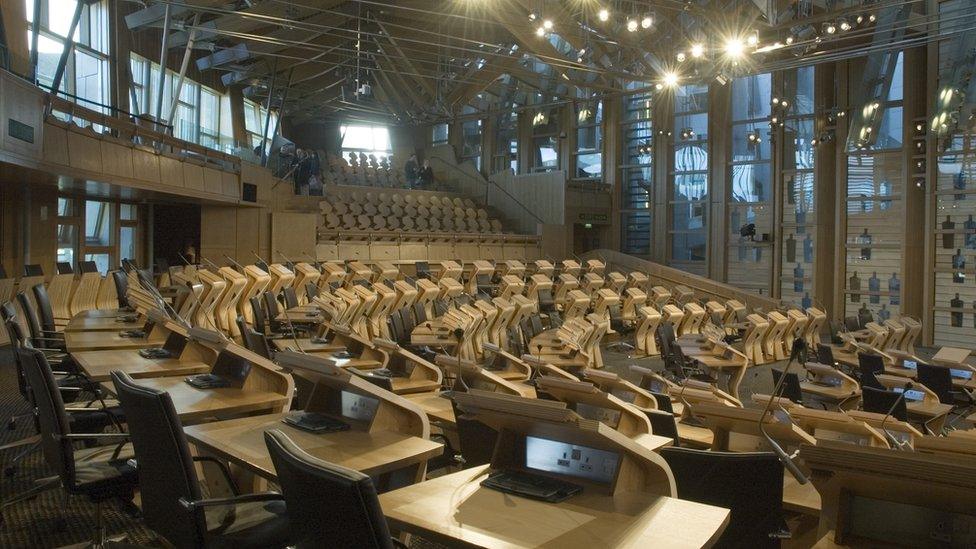Taking stock: The timid 20 years and the case for bolder
- Published

Stock-taking at Holyrood has raised concerns about whether MSPs are up to the task of handling the new fiscal risks they carry.
Some changes have come from devolved powers, some from Westminster: many have come through trends that were happening anyway.
Responding to the big issues of the next 20 years will require a bolder approach at Holyrood.
Three years on from the Brexit vote, 20 years on from the dawn of devolution, less than two years out from the sixth Holyrood election: and as the academic year draws to a close, it's time for stock-taking.
Some of the stock-taking of two decades of devolution has focussed, rightly, on the procedures of the Scottish Parliament. On at least one front, the question of whether the committees are working as envisaged chimes with concerns about budgets.
That is, there's growing concern that the partisan behaviour of committees, or perhaps it's the lack of expertise on them with complex public finance issues - either way, the money questions are getting all the more pressing and in need of tight and robust scrutiny.
And last week's gallop through numerous late amendments in the final stage of the Planning Bill show that much can be achieved with insufficient scrutiny and consideration.
We got a reminder this week of the risk of divergence in income tax revenue, coming from the Institute of Public Policy Research. Comparing and contrasting the forecasts by the Scottish Fiscal Commission and its counterpart in London, the Office for Budget Responsibility, the IPPR highlighted a growing gap opening up.
They're only forecasts, of course, and bound to be wrong.
Better outcomes
But they tell us about a direction of travel if Scottish income tax revenue fails to keep up with the level of revenue for the wider UK.
Even with the higher tax rates being charged for higher earners, and at thresholds which weigh more heavily on those same higher earners, the additional revenue doesn't look like offsetting the relative decline in income.

That is, a lot of higher-earning Scots pay more tax for the same level of income as southern taxpayers, but don't necessarily see better outcomes. That's problematic because the polling evidence has suggested that Scots are willing to pay higher tax, but in the expectation that the public sector gets better results.
Another gap was highlighted recently by the Scottish Fiscal Commission, when it pointed to the reconciliation between forecast revenue and actual outturn. That's falling quite a long way short - next year, by more than £600m.
Disorderly
The Fraser of Allander Institute, with the public finance expertise at Strathclyde University, is drawing the themes together.
Its regular forecast for this year is up one notch, but it remains weak, at 1.2% growth this year.
That assumes an orderly Brexit. A disorderly one would mean much slower growth and a possible recession. On the more optimistic end of the spectrum, an end to all the uncertainty, leading to low business investment across Britain, could bring a welcome surge in activity, and a boost to those growth figures.
Fraser of Allander is taking the 20th anniversary stock-take to look at longer-term issues.

It also finds that £500m more tax take looks like being wholly offset by the effect of lower growth. And there's nothing, for now, to suggest that divergence is about to shift in Scotland's favour - by which faster growth than the UK would deliver higher income tax revenue.
Prof Graeme Roy, director of the economics institute, says of the fiscal framework agreed between the Scottish and UK governments: "At the heart of the framework is a risk that - with the exception of population - the Scottish Budget bears the full cost of any divergence between Scottish and UK income tax performance, no matter its source or the ability of Holyrood to mitigate its impact.
"Whether or not the framework is sufficiently flexible to manage these and other risks is open to debate. At the very least, it deserves much more effective scrutiny than we have seen from parliament in recent weeks."
Working poverty
Those tax powers are a huge change for Holyrood. But the Allander survey highlights some other big, structural changes that the economy has seen over the 20 years of devolution.
Electronics and computer manufacturing (known back then as Silicon Glen) is down from 3% of the economy to 0.5%.
Women's employment rate up from 64 to 73%.
410,000 more private sector jobs, and 15,000 more public sector ones.
In the past 15 years, the number of people aged over 50 and in employment has risen by 40%.
Scottish productivity, relative to the rest of the UK, is up from 91% of the UK average to matching it, before falling back to 97% in the past couple of years.
More part-time work and self-employment.
Renewable energy generation has gone from 16% of Scotland's consumption to 75%.
Scotland's population grew by 400,000, turning around 30 years of decline.
Poverty shifted from being biased towards pensioners to being seen much more often in working households.
Financial crunch
As for the future challenges, the Strathclyde economists point to some familiar issues around productivity, climate change, demographics and inequalities.
Some of the challenges remain the same as they were: the rate of forming new companies and their growth rate, research and development in the private sector, and an export base which is too narrowly focussed on a few products, notably oil, whisky and increasingly salmon.
Tackling these decisions requires the right decisions to be made at Westminster. The financial crunch of ten years ago emphasised how much it retains the key powers for influencing the economy.
But there are powers at Holyrood that could be used to make a difference to these challenges for the next 20 years.
Says the Fraser of Allander commentary: "The Parliament has been responsible for notable and bold social policy initiatives, like the smoking ban and minimum unit pricing. It is possible to argue that in the area of economic policy, there has been a more timid approach.
"The next 20 years are likely to see economic change at least as significant as the past 20 years, as well as further change to the constitutional settlement.
"If Scotland is to meet the challenges of the next decade and beyond - and take advantage of the undoubted opportunities that will arise - it is likely to require a much bolder economic policy agenda."
